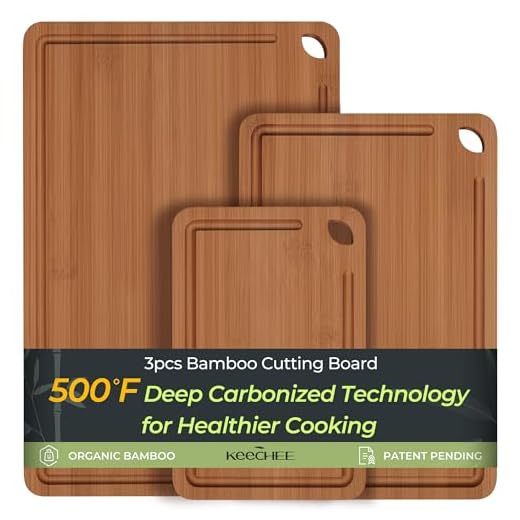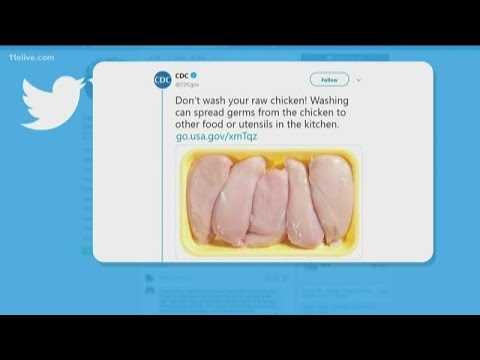







Washing chicken before cooking has long been a debated topic. Some people believe that washing raw chicken is necessary to remove bacteria and reduce the risk of foodborne illnesses. Others argue that washing chicken can actually spread bacteria and increase the risk of contamination.
So, do you have to wash chicken before you cook it?
The answer is no. The United Kingdom’s Food Standards Agency advises against washing raw chicken, as it can spread harmful bacteria like Campylobacter, Salmonella, and E. coli to kitchen surfaces, utensils, and other foods. These bacteria can cause serious illnesses, such as food poisoning.
Must-HaveROVSUN 10Qt Outdoor Fish Fryer SystemDelivers maximum heat for fast cookingThe ROVSUN 10Qt Aluminum Fish Fryer is designed for outdoor cooking, featuring a powerful 55,000 BTU propane burner and a large capacity perfect for family gatherings. Equipped with a strainer basket and safety features, it ensures a safe and versatile frying experience.
According to the FSA, cooking chicken at the right temperature (minimum 75°C or 165°F) will kill any bacteria present, making it safe to eat without washing.
It’s important to handle raw chicken with care to avoid cross-contamination. Wash your hands thoroughly before and after handling chicken, use separate cutting boards and utensils for raw chicken, and clean and sanitize any surfaces that come into contact with raw chicken.
Should You Wash Chicken Before Cooking It?
Washing chicken before cooking it is a topic that has been widely debated among chefs, home cooks, and food safety experts. Some people believe that washing chicken can remove bacteria and reduce the risk of foodborne illnesses, while others argue that it can actually increase the risk of cross-contamination and spread bacteria.
The United Kingdom’s Food Standards Agency (FSA) advises against washing raw chicken. They state that washing raw chicken can cause water droplets to spread bacteria onto hands, surfaces, clothing, and cooking equipment. The heat from cooking is enough to kill any bacteria present on the chicken, so there is no need to wash it beforehand.
Furthermore, washing chicken can lead to the splashing of water contaminated with bacteria, such as Campylobacter or Salmonella, onto nearby surfaces, utensils, or other foods, increasing the risk of cross-contamination and foodborne illnesses.
It is important to note that proper cooking is the most effective way to kill bacteria and ensure that chicken is safe to eat. The FSA recommends cooking chicken until the juices run clear and there is no pink meat. Using a food thermometer is a reliable way to ensure that chicken has reached the appropriate internal temperature of 75°C.
In conclusion, it is not necessary to wash chicken before cooking it. Washing can actually increase the risk of cross-contamination and spread bacteria. Proper cooking and handling techniques are the best ways to ensure the safety of chicken and avoid foodborne illnesses.
The Controversy of Washing Chicken

Washing chicken before cooking it has long been a common practice for many home cooks. The belief is that by rinsing the chicken, you remove any bacteria or contaminants that may be present on the surface of the meat. However, there is a growing debate among experts about whether this step is necessary or even safe.
One argument against washing chicken is that it can actually spread bacteria around your kitchen. When you wash raw chicken, water droplets can splash onto countertops, utensils, and other surfaces, potentially contaminating them with harmful pathogens like salmonella or Campylobacter. This cross-contamination risk can be especially dangerous if you are preparing other foods on these surfaces, as it can lead to foodborne illnesses.
Another point to consider is that washing chicken does not effectively remove bacteria. Cooking at the appropriate temperature is the most effective way to kill any bacteria that may be present on the meat. By relying on proper cooking techniques, you can ensure that the chicken is safe to eat without the need to wash it beforehand. The heat from cooking will destroy any bacteria, making it unnecessary to rinse the chicken and potentially spread contamination.
Furthermore, washing chicken can be a messy and time-consuming process. Not only does it add an extra step to the cooking process, but it also requires careful handling to prevent any splashing or spills. This can increase the risk of accidents in the kitchen and make the overall cooking experience more stressful.
In recent years, several reputable sources, including the United States Department of Agriculture (USDA) and the Food Standards Agency (FSA) in the UK, have advised against washing raw chicken. They recommend that you simply remove any visible fat or feathers before cooking it. This change in guidance reflects the growing consensus among experts that washing chicken is unnecessary and potentially harmful.
So, should you wash chicken before cooking it? The decision ultimately comes down to personal preference and the specific advice of reputable sources in your country. However, it is important to consider the potential risks of cross-contamination and the fact that cooking at the appropriate temperature will thoroughly kill any bacteria that may be present. By practicing proper food safety measures and cooking chicken thoroughly, you can ensure a safe and delicious meal without the need for washing.
The Concept of Cross-Contamination
Cross-contamination is the process by which bacteria or other microorganisms are unintentionally transferred from one object to another. In the case of food preparation, cross-contamination occurs when harmful bacteria from raw or uncooked food comes into contact with ready-to-eat food, utensils, or surfaces.
This can happen through direct contact, such as when raw chicken juices drip onto a cutting board used for vegetables. It can also occur indirectly, when hands, utensils, or surfaces that have come into contact with raw food are not properly cleaned before being used with ready-to-eat food.
The Dangers of Cross-Contamination
Cross-contamination can lead to foodborne illnesses. When bacteria from raw or uncooked food contaminates ready-to-eat food, it can quickly multiply and cause illness if consumed. Common foodborne pathogens, such as Salmonella and Campylobacter, can cause symptoms like vomiting, diarrhea, abdominal pain, and fever.
Pregnant women, young children, the elderly, and individuals with weakened immune systems are particularly vulnerable to these illnesses. The consequences can range from mild discomfort to severe illness, hospitalization, or even death in severe cases.
Preventing Cross-Contamination
Proper food handling and hygiene practices are essential for preventing cross-contamination. Here’s what you can do:
- Separate: Keep raw meat, poultry, and seafood separate from other foods, especially ready-to-eat foods. Use separate cutting boards and utensils for raw and ready-to-eat foods.
- Clean: Always wash your hands, utensils, and surfaces with hot, soapy water before and after handling raw food. This includes cutting boards, knives, countertops, and even kitchen towels.
- Cook: Cook food, especially meat and poultry, to the appropriate internal temperature to kill bacteria. Use a food thermometer to ensure proper cooking.
- Chill: Refrigerate perishable foods promptly at or below 40°F (4°C) to slow down the growth of bacteria.
By following these guidelines, you can reduce the risk of cross-contamination and keep yourself and your loved ones safe from foodborne illnesses.
Understanding Harmful Bacteria
When it comes to food safety, understanding harmful bacteria is crucial. Bacteria are microorganisms that can cause foodborne illnesses if consumed. These illnesses can range from mild gastrointestinal discomfort to more serious infections.
Common Types of Harmful Bacteria
There are several types of bacteria that are commonly associated with foodborne illnesses. Some of the most well-known ones include:
| Bacteria | Common Food Sources | Symptoms |
|---|---|---|
| Salmonella | Poultry, eggs, dairy products | Nausea, vomiting, diarrhea, fever |
| Campylobacter | Poultry, unpasteurized milk, contaminated water | Diarrhea, abdominal pain, fever |
| E. coli | Undercooked ground beef, raw vegetables, unpasteurized milk | Severe abdominal cramps, bloody diarrhea |
| Listeria | Soft cheeses, deli meats, smoked seafood | Fever, muscle aches, nausea, confusion |
Preventing the Growth of Harmful Bacteria
Proper food handling and cooking techniques are essential in preventing the growth of harmful bacteria. It is important to wash your hands thoroughly with soap and warm water before and after handling food. Additionally, keeping raw and cooked foods separate, cooking food to the appropriate internal temperature, and storing leftovers properly can help minimize the risk of bacterial contamination.
It is also crucial to clean and sanitize kitchen surfaces and utensils regularly to prevent cross-contamination. Using separate cutting boards for raw meats and produce, and washing them thoroughly after each use, can further reduce the spread of harmful bacteria.
By understanding the risks associated with harmful bacteria and following proper food safety practices, you can protect yourself and your loved ones from foodborne illnesses.
Proper Cooking Kills Bacteria
One of the most important things to know about cooking chicken is that proper cooking kills bacteria. The heat from cooking chicken kills any bacteria present, including those that may be harmful.
It is not necessary to wash chicken before cooking it. In fact, washing chicken can actually increase the risk of spreading bacteria. When you wash chicken, the water can splash and spread bacteria onto countertops, utensils, and other surfaces.
It’s important to cook chicken thoroughly to ensure that any bacteria present are killed. The internal temperature of cooked chicken should reach 165°F (74°C) to ensure that it is safe to eat.
Why is proper cooking important?
Cooking chicken to the correct internal temperature is crucial because it eliminates bacteria that can cause foodborne illnesses. Bacteria such as Salmonella and Campylobacter are commonly found on raw chicken. These bacteria can cause symptoms like nausea, vomiting, diarrhea, and fever if ingested.
Proper cooking ensures that these bacteria are destroyed, making the chicken safe to eat. It’s important to use a food thermometer to check the internal temperature and to avoid overcooking or undercooking the chicken.
Additional precautions
While proper cooking is effective in killing bacteria, it’s also important to take additional precautions when handling raw chicken. These include:
- Keeping raw chicken separate from other foods to prevent cross-contamination.
- Washing hands, utensils, and surfaces that come into contact with raw chicken with hot, soapy water.
- Refrigerating raw chicken promptly to prevent bacterial growth.
By following these guidelines, you can ensure that your chicken is safe to eat and free from harmful bacteria.
Questions and answers
Should I wash chicken before cooking it?
It is not recommended to wash chicken before cooking it. Washing raw chicken can actually increase the risk of spreading bacteria like salmonella to your kitchen sink, countertop, and other surfaces.
What is the best way to clean chicken before cooking?
The best way to clean chicken before cooking is to simply pat it dry with paper towels. This helps remove any excess moisture, which can improve browning and crispy skin when cooking.
Can washing chicken remove bacteria?
No, washing chicken cannot remove bacteria. In fact, washing raw chicken can actually spread bacteria around your kitchen and increase the risk of cross-contamination. It’s important to cook chicken to a safe internal temperature to kill any bacteria present.
What should I do if I accidentally washed chicken before cooking?
If you accidentally washed chicken before cooking it, it’s important to thoroughly clean and sanitize any surfaces that may have come into contact with the raw chicken, such as your sink and countertops. Use hot, soapy water and a disinfectant to ensure proper sanitation.







